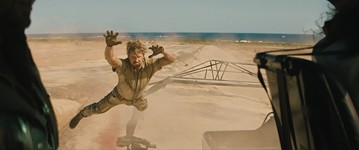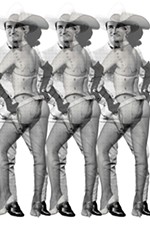David Sedaris and the Art of Ignoring
Austin-bound, the author adds a new descriptor: controversial.
By Richard Whittaker, 7:00AM, Sun. Apr. 28, 2024

David Sedaris is used to crowds. As a New Yorker, he’s used to being in one of the most crowded cities in America: not crowded as in simply packed, but in the constant presence of a bubbling humanity in its streets.
At the same time, as an author, raconteur, and performer, he’s used to drawing a crowd, just as he will this week when he performs at Dell Hall at the Long Center, reciting from his books and essays. So it’s no surprise that the pandemic loomed over his most recent book, 2022’s Happy-Go-Lucky, a series of personal essays chronicling his lockdown claustrophobia and his excursions into an empty America. Looking back, he said, “I don’t know how we did it. It just felt so hopeless to me. In New York City, there was nobody in the streets. So I still think of that. When I take a walk, I think, ‘Wow, look at all these people. None of them were here during the pandemic.’”
As for his own crowds, it wasn’t until early 2022 that he could head back to the stage and the all-new old touring life. “At the very start of it, the theatres had rules, everybody had to wear a mask, and there were plastic barriers up when I would sign books. We all did it, got through it, and now I guess I’ve kind of forgotten. It’s so completely back to normal.”
Yet it’s only now, nearly two years on from the publication of Happy-Go-Lucky and that first Covid-era tour, that he feels audiences are comfortable with pandemic material. Indeed, the first time he went on tour he wrote some material about the pandemic, “and when I read it six months later, people went, ‘Eh, we’d like to forget about that time. … People just needed a little break before then, I suppose.”
But what’s the old saying about the past not being done with us? In 2022, he was with his friend Dawn in Chicago O'Hare International Airport. He recalled that she was still wearing a mask, “and I said ‘Dawn, take it off. It’s time to let it go. Take your mask off’ and so she did, and she immediately got Covid.”
So, instead, he travelled an empty world. “We went to London, we went to Sussex, we went to North Carolina a lot. And it was interesting to look around and see. In North Carolina it was like, ‘What pandemic? It doesn’t exist, what you’re talking about.’” It was similar during the Black Lives Matter protests. In New York at the time, he said, “Take a walk and you run into one. And then you went to North Carolina and, huh, never happened.”
He describes those experiences in North Carolina, in Sussex, even Paris, as a vacation, a relief of sorts, using the loaded term “war zone” about New York. What exactly does he mean by that? “Protests, and people just really screeching at each other. People put up signs, and people tear the signs down, and then people see the signs being torn down, and it’s just conflict. Constant conflict.” For Sedaris, it’s like the constant angry online infighting has finally taken over the streets. “There’s no break from it. You leave your house and you walk down the street, and it’s like living on the internet.”
But he doesn’t just tour to get out of NYC (and, for all his kvetching, Sedaris always seems to end up back in Big Apple when he’s done). His tours become an opportunity to measure the state of the nation, which informs his writing. For example, he noted that, during the last election cycle, face masks became the new campaign buttons. “Usually, a campaign button is pretty small, and you might see someone at the airport, and you might smile at them and then you look at their campaign button and you go, ‘Oh my god, I wasted a smile on them.’ Now you wouldn’t even start because of the face mask.” That’s why he sees this election cycle as different: “You won’t have a campaign button that can be seen from across the room.”
However, Sedaris still has the ability to cause contention. Last November, he penned a column for the conservative blog The Free Press called "Punching Down," in which he bemoaned modern parenting, indulged children, and physical punishment. For him, “it’s an age thing. People my age, you grew up, your parents hit you. I’m not talking about beating you, I’m not talking about sending you to the hospital. I’m talking about slapping you across the face every now and then because they don’t have time to say, ‘Go to the corner and have a time out’ because you have six kids and you just can’t do that.’”
If it had been printed in his more regular publishing venue of The New Yorker, the brief essay probably would have raised few eyebrows. After all, nothing he wrote about kids today was particularly out of keeping with what he wrote in The Santaland Diaries, a play which has been a Christmas fixture just down the street at the Zach Theatre for a decade or two. But it appeared in a publication that is basically Bari Weiss and her pals venting about libs and communists. The backlash and controversy has been the most intense of Sedaris’ career, and his response is simple. “I didn’t read any of it. I have no idea. None.”
What a change for the writer who, a quarter century ago, told the Chronicle, “If somebody hates me, I just go to pieces.” But then again, avoidance is the logical solution for someone who increasingly despairs of online interaction.
If anything, he’s found some of the backlash a little infuriating. When it comes to being hit by his own parents, “we got over it [but] somebody said I must have PTSD.” At this thought, he emitted an extended, forced, stage laugh. He refuses to be labeled as having gone through trauma because “the word trauma is special. … To me, trauma is ‘You don’t have any legs because you stepped on a landmine.’ It isn’t ‘Your parents didn’t take you to see Dune on the opening day.’”
He sighed. “You can’t even guess what people are going to get wound up about.” Recently he penned a piece for The New Yorker that he described as “a portrait of a long friendship … an essay about two people who have loved each other for a long time.” The subject was his traveling companion Dawn, and he included the whole demasking/Covid story. That paragraph went viral, and he was accused of being ableist. “‘You bullied your friend, your vulnerable friend. You’re lucky. She almost died of Covid, and it’s all your fault. I hope she never talks to you again.’ And I went, ‘THAT’S what you got out of this essay?’ Somebody’s going to read an essay like that, which to my mind is beautiful, and that’s their takeaway?”
David Sedaris
Friday, May 3
Dell Hall at the Long Center for the Performing Arts
thelongcenter.org
A note to readers: Bold and uncensored, The Austin Chronicle has been Austin’s independent news source for over 40 years, expressing the community’s political and environmental concerns and supporting its active cultural scene. Now more than ever, we need your support to continue supplying Austin with independent, free press. If real news is important to you, please consider making a donation of $5, $10 or whatever you can afford, to help keep our journalism on stands.
May 9, 2024
May 10, 2024
David Sedaris, Dell Hall, Long Center








